#flight traning
Explore tagged Tumblr posts
Note
Sorry for the spam likes today. Favorite jazz album?? I saw a post on your blog that mentioned Mingus ah um. That’s either my fave or Birth of Cool (Miles Davis does do my favorite version of On Green Dolphin Street). Though both are kinda basic choices I want to expand my listening.
so i'm gonna give you a few albums (and album-adjacent things) with the caveat that i haven't heard most of what's out there ^_^ i'm just a casual fan
ornette coleman - the shape of jazz to come
this album is on another level. the multiple layers of brass crisscross each other, playing dissonant chaos, then they rip into solos that could melt charlie parker's fingers. the bass shreds and stumbles up and down some wild assortment of scales. the drums patter out a frantic rhythm that somehow ties everything together.
it shouldn't make sense, but it feels so alive. you'll catch quotes from flight of the bumblebee over rainy oceans of rhythm. herds of wild animals shuffle back and forth in a forest painted by jackson pollock. and then whoever's not soloing yells "woo! alright!"
it's not even my favorite ornette coleman recording. that honor goes to this youtube upload of a live show in germany, 1978. the bass intro, instantly picked up by the drummer, is so electric. the haunting melodies, borrowed from the rite of spring, are traded from sax to guitar. the whole band feels like they're operating on instinct. this is what a basquiat painting SOUNDS like. like a genius artist drawing with their non-dominant hand. LITERALLY coleman plays a violin left-handed at one point. it's incredible.
john coltrane - my favorite things
trane puts so much panache into this simple little pop song. the opening chords are heavy with drama. the groove is insanely tight. every time he plays the melody, it's got a new rhythm, to the point where he seems to be playing a game with the listener. "how many ways can i get you to feel this groove?" the song is melted, bent, and stretched like molten glass, in a 13 minute display of total virtuosity
and that's just track 1!!!! this album is timeless. every second is as fresh and vibrant as it was in 1961
herbie hancock - headhunters
herbie has always been at the cutting edge of jazz fusion. this is his definitive statement on funk
this album is intensely rhythmic, laying out catchy melodies over funk foundations. the whole band seems to just be having a blast. the grooves are often busy and hypermelodic, with no room to breathe as everyone jams at once. it's like an all-night house party in a bouncy castle full of confetti
if you're a fan of japanese jazz like caseopia, or jazz-influenced video game music, this album will feel shockingly familiar to you. its wildly creative synth work, uplifting and colorful chords, and eclectic sound palette are all DECADES ahead of their time.
where would we be without herbie? i'd wager the entire global music landscape would be different. from hip hop to big beat to drum n bass, we all stand on the shoulders of giants. hancock is a titan. the giants that raise us up are standing on his shoulders
39 notes
·
View notes
Text
Dance of Death Chapter 12:
Warren Raizden
Content: mild humiliation, whipping (3rd party), child abuse, beating, gaslighting
"Nife!" Warren called. "It's me! Where are you?"
For the hundredth time, nothing. The panic in his gut was getting harder to swallow down.
Warren had climbed down a few levels as soon as he was out of sight of the enforcer that had sent him to the station to give a report.
He felt long-distance with his nightsight, all around the tower, feeling nothing. He wondered if they'd caught her. Or someone that knew where she was. At any rate, it didn't seem like he was going to find her out here.
He sighed, turning in the direction of the enforcer station. He'd better go there.
Warren went down the steps to the public entrance to the enforcer's station. As he walked up, two sobbing Druids were pushed out separately. One of them was squeezing a mangled hand, trickling blood from a fleshy stump where the thumb should be.
Warren masked his deep-seated rage at the horrible treatment with a grim lift of his chin. He couldn’t afford to let that get to him.
The enforcer behind him was disgustedly closing the door as Warren hurried up, flicking drips of rain off the ends of his hair and glaring.
"Hold the door," He ordered.
"And who are you?" The man said.
"Warren Raizden." Warren said, quietly.
"Warren Raizden." The man repeated loudly.
Warren came in, already flushing with anger. He didn't like seeing what they'd done to the Druids on their way out, and he didn't like having his name announced to everyone in the room when he was in an embarrassing situation like having to give testimony about a riot.
"Here to be questioned about the riot, as well?" The irritating enforcer went on.
"I guess so." Warren looked around the room, stuffing his hands into his pockets to calm himself down. There were a lot of enforcers at tables in the other, more well-lit side of the room. The announcement had caught the attention of a large group of enforcers, who were occupying several tables on the better-lit end of the room.
"You guess?" The irritating man said loudly.
"And you are?" Warren said.
"Trane. Mister Trane to you, boy." He said. "Now are you here for questioning or not?"
"I am, and I don't have all night, Trane." Warren found himself nearly snarling. He was used to being treated with more respect.
Trane grabbed him by the arm and pulled him toward a wide flight of stairs to the right.
"This way, then, Warren."
Warren resisted the urge to pull his arm free. Fighting an enforcer was a dangerous thing to do.
"I'd thank you to treat me with more courtesy." He said, barely keeping from growling the words.
"I'd thank you to shut your mouth, but we don't always get what we want, do we?"
Warren forced himself not to reply, knowing he'd say something indecorous if he did.
"The man we're going to meet with saw you at the riot." Trane said, pulling him to a stop at the top of the stairs. He opened what looked like a barracks door with a small, detailed key, and pushed Warren inside.
There was a stench, and crying from multiple occupants. Rusty bunks lined each windowless wall. Chamber pots sat by each one, and most of the bunks had a prisoner chained to the bars of the bed. Nife wasn't in here.
Looking across the room, Warren recognized Flower, kneeling, under the whip of an enforcer.
"I never, I never saw her, after she was crushed!" He sobbed.
The enforcer lashed him across the back. He screamed,
“Please!”
"We know that's a lie! Lying Druids."
"Stop it." Warren shook off Trane and strode toward the man with the whip, who turned on him furiously, glanced at his ear with four earrings, and hesitated.
"What?" He said finally. "He is lying."
Warren suppressed the urge to punch the Bane in the face, holding his fist at his side. No need for another scandal for the Raizdens.
"You don't know he's lying." He said. "You're just beating him for being a Druid, you..." He found himself at a loss for something appropriately insulting.
But the man laughed at him.
"Nife was recognized running from the scene." He said. "So yes, I know he's lying."
He was about to turn back to beating Flower, but Warren grabbed his arm. The enforcer's jaw dropped.
"Nife was recognized?" Warren seethed, grip tightening till the man winced. "Shouldn't you be getting on that?"
The enforcer looked down at his hand, outraged.
"You want to think again, boy?"
Warren let him go, rage creasing his face.
"You want to talk to me." He said. "I'm her brother."
"He's you're suspect, Yellit," Trane added. "Don't you recognize him from earlier?"
Yellit tilted his head at Warren, then let out a little laugh.
"That's funny." He said. "Your face looks so smooth in the papers."
He turned to Flower and kicked him in the leg.
"You. Get your ass out of here!"
Flower scrambled to his feet and pushed past Warren, dashing away down the stairs.
Warren looked after him for a moment. Out of all Nife's friends, the asshole had nabbed the Druid. Were all enforcers like this?
"They won't talk without a kick or two." Yellit said, looking Warren challengingly in the eye. "I assume you won't be like this rabble? Heard you were raised half-Bane."
Warren suppressed an aggressive comment. No point letting them rile him up. Instead, he said,
"I trust you understand that I'll be reporting any bad conduct I observe."
"Touch of the whip never hurt nobody," Yellit said. "Least not a Druid."
Yellit's eyes dared Warren to say something.
He didn't.
"It's all they can really understand." Trane agreed. "That's why I wanted you to see that, Warren. Don't want you to try lying to us."
"I hope it comes back to bite you." Warren said, then flushed again, because he was supposed to hold that kind of thing back.
"You know it's against the law to threaten a police officer?" Trane pulled him from the room. He locked the door on the prisoners.
They went down the hall, lit poorly with sconces. Warren felt his mind waking up as it got later in the night. Things like flame threw off his nightsight, and he felt blind as a Bane as Trane pushed him into a small office.
They sat down across a table from him.
"Well?" Yellit said.
"Well, what?" Warren said.
"You were there. Who organized the riot."
"I was out for a few minutes at most." Warren said.
"If you were out for only a few minutes, how did you know where to look for your sister?"
Warren hadn't lied yet, but he'd been taught to always check on what information you've provided to a person, to keep your story straight and limited.
"I never said I was looking for her."
"Then what were you in such a hurry about? Why were you there? Were you there to find your sister, or were you there to riot?" Trane said.
Warren hesitated. If he said he was looking for his sister, they'd assume he was in on whatever happened at the Wrys.
"...No." He said finally. "I wanted to know what the fuss was about, and it was focused on the Wry mansion, so that's how I ended up moving in that direction."
"You're not known to be recklessly curious, Warren."
Warren thought about Nife, at that. Running for it right now, from these people.
"That's true." Warren said simply.
"Then I'll ask you again." Trane said. "What were you doing at the riot."
"Looking." Warren said. "Then leaving."
"You expect me to believe that?" Yellit yelled.
"Do what you want." Warren snapped. "You asked for my statement. I gave it."
"You are not going to waste my time like this!" Yellit yelled. "You will talk!"
"You have three minutes to ask me a reasonable question." Warren said, checking his pocket watch. He'd been trained for this kind of irrational behavior, at least.
Yellit turned red and Trane rose.
"Or what!" Yellit smacked the table.
"Until I leave. I have an appointment." He had an appointment with his bed. Bane customs forced him to act diurnal.
"You leave when I say you can leave." Trane growled down at him.
"Then I suggest you say it in the next three minutes."
Trane jumped forward furiously, grabbing him by the coat collar and pulling him up to his feet. When Warren actually stood up straight, Trane had to tilt his head back to look him in the eyes. He shoved Warren backward until his back hit the wall. Warren's eyes widened. He hadn't expected them to get violent with the son of a noble.
If it came to a fight, he wasn't sure what he'd do. Break the law and fight back? His family couldn't handle a fine. He couldn't let there be a fight.
"Listen here, you blue piece of shit." Trane said into Warren's face.
"Raizden." Warren interrupted simply, staring down at Trane. "My name is Raizden. Son of Lord Raizden. Are you forgetting that?"
Trane faltered, glaring into his eyes. Yellit approached, hand on a weapon at his waist as if waiting for Warren to make a move, give him an excuse. Warren didn't. Finally Trane released him with a shove.
"Get out of here." He said.
Warren opened the door and went down the hall. He waited till he was out of sight to sigh with relief.
"Fuckin blue rich kids." He heard Trane mutter after him.
The house was dark and quieting down by the time Kit and Caboodle arrived home with their father, and the slaves that came out to greet them looked like they'd been caught mid-nap.
As Kit and his father removed their cloaks, Caboodle took off his boots and set them to the side in the entryway.
"Caboodle." Dad snapped. "Why are you leaving your damn boots in the walkway?"
"Sorry," Caboodle mumbled, picking them up and waiting for dad to leave the foyer so he could put them back in the same place.
Caboodle knew as well as Kit did that their father was just irritable; there was nowhere better to put the boots.
"Well don't just stand there, put them away!" Dad shouted.
Caboodle flinched at the noise.
"Where else is he supposed to put them?" Kit interjected.
His father turned on him.
"Why are there goddamn boots in my house in the first place?" He demanded. "This isn't a Druid house, we have good feet in this house, we don't need to go clip-clopping around in those damn boots in the first place!"
Kit tried not to retort, instead letting out a short sigh. He’d tried to tell Caboodle just go barefoot like the rest of the nobles, but he insisted that boots were stylish.
"Well there's no need to fight about this." Kit said.
"That's rich, coming from the one who started shit." Glen walked up until they were chest-to-chest, emphasizing the fact that he was taller than his son with a deep breath in. "So why don't you finish it, like a man."
Kit's heart thumped faster, scared and angry. His father was calling him a coward, daring him to fight back.
"Kit..." Caboodle said in a high-pitched voice. "Please don't fight."
"See?" Glen said. "Even he knows you started this."
"I did not!" Kit said.
Caboodle eased away as their father's voice raised up louder and louder.
"You dare talk back to me, boy?" He said. "Ever since you were a child you've been starting shit! First the house, then the marriage, and now you tear us apart right when we need to be pulling together as a family!"
Kit flinched at the accusations, then just as he was about to get angry again, his father added--
"Your mother is missing, she might be dead! Ever think of that, Kit? Ever think of that?"
The words fell into a dead silence.
Caboodle was not visible anymore, but he was likely just around the corner, holding his breath and hugging himself, as he usually did when this kind of thing went down.
Kit let out his breath, feeling like there was a heavy rock in the pit of his stomach.
"I didn't sign the documents, dad, and I didn't start this fight."
A slap, then a punch, landed on his face before he got his guard up, crouching under his fists with a wince. Glen just yanked his arms down and kept punching. It was the mouth hits that hurt the worst.
“W–I–” Kit sputtered as tears came to his eyes.
Punch after punch knocked his head back until his father was pushing him against the wall and punching him against it. The heavy fist crushed into his stomach and ribs, and it was all Kit could do to grip the door frame to keep from crumpling, cringing over his body to protect it from the blows.
When he finally stopped, Kit felt a quiet whine leaving his throat as his knees gave out, and he fell forward on the ground.
"I don't want to hear that blaming, gaslighting shit from you ever again." Glen panted, pointing down at Kit. "You hear me? You put the blame where it belongs."
Kit said nothing. Tears silently dripped down his face with the blood, onto forehead where it pressed against the stones, puddling together on the floor.
Glen slumped away like a harrowed victor.
Kit got up slowly after Glen was out of earshot and pulled out a wrinkled handkerchief to wipe his nose and eyes. It came away with blood from his mouth and nose. He grimaced, stooping over as he trudged into the hall toward his bedroom.
"Hey," Caboodle said.
Even having expected he'd be there, Kit jumped a little, cursed under his breath and winced, turning his face away. It was humiliating having his little brother looking at him with so much concern, even though he knew there was no scorn there. He was just so tired of losing.
"I'm not in the mood, sorry." He said, when his brother kept giving him the baby-deer eyes.
"I know something for that." Caboodle said, walking down the hall a little bit and beckoning. "Come on."
Kit watched his brother leading the way. He was so tired, he just wanted to go to bed.
But Caboodle looked back at him with a hopeful smile, like he was so certain he could help Kit feel better, so Kit followed with a sigh.
Caboodle led him through his own room and went up to the window. He opened the window, propped it there with a grin at Kit, and climbed out with such ease that Kit guessed he probably did this a lot. The roof sloped over the area, making a cave-like opening for them to sit and look out at the city.
Kit got through with a bit more trouble, and when he did, Caboodle reached back and closed the curtain, then the window.
Then he leaned back and took a deep breath.
"Nobody can see us, hear us..." He gestured to the lights in the streets below. "All the city below us. Nobody'll ever guess where we are."
He smiled with such satisfaction, it was like he believed that this little rooftop spot was all anyone could ever want from life. As Kit leaned his head against the side of the alcove, his mind raced over the conversation once more, and his head and face started to hurt again.
Caboodle must've seen him getting upset, because he patted him on the shoulder.
Kit shot him an anxious look.
"Nobody can see anyway." Caboodle shrugged. "Isn't it okay for people to touch each other just a little? I mean Druids do it."
Kit sighed.
"Sure, it's just... I'm not used to it. And if you do it in front of people..."
"I'm not going to embarrass you." Caboodle said with smug confidence. "Don't worry."
"Yeah, I get embarrassed enough at home, no need to make it happen in public too." Kit tried to laugh, and then groaned slightly instead. "I don't know why I always..."
"You know it's not your fault." Caboodle said. "Right?"
Kit stared down at his bare feet, digging them into the tiles.
"I could've left. Or just refused to speak."
"Yeah and get slapped until you talk." Caboodle scoffed. "It's not your fault, bro. I'm a third party. That's how I know."
Kit let out a relieved chuckle.
"Maybe you're right."
The admission brought the stress back, though. For a minute, thinking it was his fault seemed more appealing.
"But that means I have nothing I can do, I can't stop him." He blinked down at the lights below. "And when it's you he's angry at... What if one day..."
Caboodle didn't say anything for a long time. They stared down into the dark city, ignoring the cold stars for the grimy gas lamps along 20th street. Finally, Caboodle hugged himself a little tighter and spoke.
"I think... You should just do the right thing, and don't worry about me." He smiled innocently. "Don't you think?"
Kit stared at him for a moment, then shook his head and looked back out. He started to speak, stopped, covered his mouth, and tried again.
"You're a really... really kind kid, aren't you?"
"Huh?" Caboodle looked up and laughed. "Where did that come from?"
Kit felt the relieving laughter coming out stronger now, and for some reason, his comment seemed actually hilarious. The two of them sat there laughing, looking out at the city, till their stomachs were sore from it.
"Now you can't tell anyone about this spot, okay?" Caboodle said with mock seriousness.
"Swear on my wife." Kit said, and they burst into laughter again.
After a minute, Kit finally said good night. He left his brother out there, staring up at the sky with a happy, charmed expression.
First chapter: Next chapter:
Taglist: @tildeathiwillwrite @mimostic @fleur-a-whump @a-n-j-a-maria
Per Tumblr's content policy, this is the non-nsfw version of Dance of Death.
For anyone following along on this story that wants the canon NSFW version of the story, you can get the book on amazon for $0.99, but I just want to make it possible for anyone to access.
If you like this book, it would mean so much to me if you leave a review of Dance of Death on Amazon.
#hurt/comfort#child abuse whump#whump writing#whump readers#whumpblr#dark fantasy novel#male whumpee#gaslighting whump#gaslighting parent#adhd whumpee#gaslamp fantasy
4 notes
·
View notes
Text
Forging Pilots in the Ecuadorian Air Force
In the field of pilot training in the Ecuadorian Air Force, the 2412 ESCORPIONES Training Squadron plays a awesome role. In this blog, we will explore the aircraft used by this squa and its importance in training new pilots. Let's learn more about this aircraft and its contribution to the development of skills and competencies in the aeronautical field.

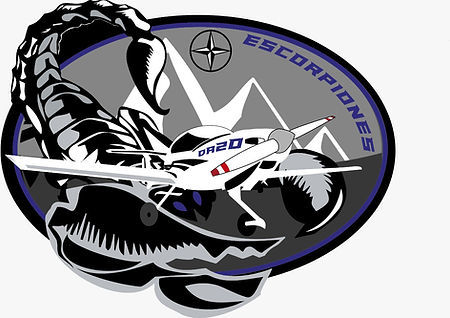
The Aircraft of the Training Squadron 2412 SCORPIONS:The plane used by the 2412 Training Squadron of the Ecuadorian Air Force is a recognized model in the field of flight instruction: The Diamond DA20 C-1 Eclipse. This single-engine, low-wing, conventional
landing gear aircraft is highly reliable and versatile, making it an ideal choice for initial pilot training.
Functions and features:

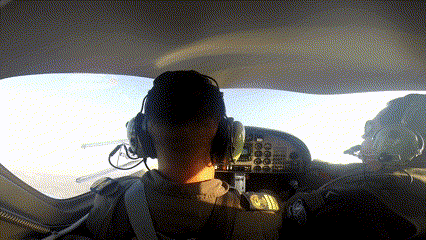
The Diamond DA20 C-1 Eclipse is known for its simplicity and stability, making it ideal for basic and advanced flight instruction. It is equipped with a 210 horsepower piston engine and has adequate payload capacity for two people (student pilot and instructor), the air forcé got to adapt to the few resources allocated and this plane does so, ir has check out whith many hours of flight, added to the fact that its operating costs are not pricey.
One of the notable features of this aircraft is its instrument panel, which is designed to provide trainee pilots with a familiarization with the instruments and systems found in more complex aircraft. This allows students to acquire fundamental skills in navigation, communication, instrument reading and aircraft control.
Importance in the Training of Pilots:


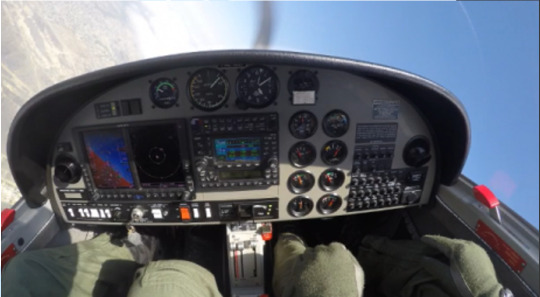
The 2412 SCORPIONES Training Squadron light aircraft plays a crucial role in the training of future pilots of the Ecuadorian Air Force. By using an aircraft with low operating and maintenance costs, it is possible to optimize resources and provide more accessible and efficient flight instruction.
Thanks to its friendly design, stable handling and chilling out for to pilotage, the Diamond DA20 C-1 Eclipse allows students to become familiar with basic flight maneuvers such as takeoff, landing, turns, and straight and level flight. In addition, it is used to instruct future pilots in advanced techniques, such as basic instrument flight, visual navigation, and emergency procedures.
Conclusion:
The small plane of the Training Squadron 2412 SCORPIONS of the Ecuadorian Air Force, represented by the Diamond DA20 C-1 Eclipse, plays an essential role in the training of the country's military pilots. Through its reliable design and its ability to provide basic and advanced instruction, They have been hang out in traning that it contributes to the development of skills and competencies necessary to operate more complex aircraft.
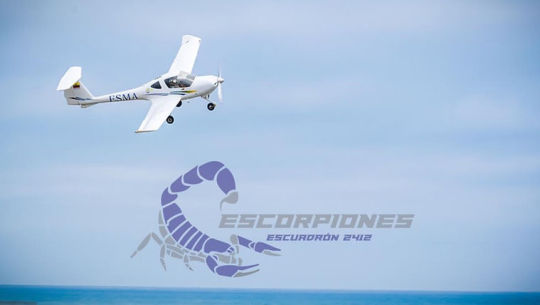
8 notes
·
View notes
Text
Piano, Bass, and DRUMS Twice at MEZZROW
EHUD ASHERIE with Paul Sikivie/David Wong and Kenny Washington, 26 APRIL 2025, 9 pm set
CAELAN CARDELLO with Jonathan Muir-Cotton and Domo Branch, 18 APRIL 2025, 9 pm set
Both EHUD ASHERIE and CAELAN CARDELLO are worthy pianists. ASHERIE is a fixture on the scene while CARDELLO is an exciting rising star. ASHERIE’s phone calls get answered by top-flight rhythm sections while CARDELLO stands by the folks who knew him when with when being recently. Kenny Washington was mesmerizing with ASHERIE while Domo Branch too brought a subtle maturity beyond his years. For these two gigs I heard drummers.
EHUD ASHERIE is always worth seeing and he does have strong rhythm sections. I don’t always catch his gigs, but Kenny Washington’s presence made the stream imperative. He is a master at drumming in a trio as Bill Charlap well knows. He is not obtrusive nor even flashy exactly, but there’s lots of smart things going on and he is a presence. Naturally the Trinidadian calypso Sly Mongoose was a chance for him to shine, but like the Fats Waller tune they all avoided cliche and let both tunes breathe. Asherie did the bossa solo, but Washington couldn’t help but tap his legs. There were standards, ‘S Wonderful and I Hear Music, which swung solidly at various tempos. And ballads (Tadd Dameron’s Soul Trane) with taste and majesty. David Wong was delayed, missing the first tune of the set, so Paul Sikivie stayed over from the previous trio. Both were solid but perhaps Wong didn’t quite settle in. Both brought their own instruments settling the question I had whether there was a house bass. Obviously there’s a piano and also the drums of the kit while drummers bring in their own cymbals.
CAELAN CARDELLO continues to impress me with the right mixture of power and taste. That taste includes playing tunes by the likes of Phineas Newborn Jr and Kenny Barron (New York Attitude was crisp and fast). Softly As In A Morning Sunrise opened not softly at all all the way through. They were firing on all cylinders and let it out on the back turn. There was a blues that roared, a left hand vamp that turned Latin, and a couple of originals including the closer which was familiar enough and certainly catchy. Domo Branch was essential throughout. He had a ride cymbal to go with the high hat with a cowbell as a second cymbal while also using his rims. Cardello is a big player and Branch can hang with him to be sure, but some of his strength is in his subtlety. Washington gave a seminar in appreciating trio drumming the night before, so I was primed to hear Branch sympathetically.
0 notes
Note
Flight issues for US level the playing field a bit
https://www.aftonbladet.se/sportbladet/fotboll/a/APgGXq/trinity-rodman-saknades-pa-traning-infor-attondelen
yea I guess so
0 notes
Text
Allah supreme: how Pharoah Sanders found freedom and rebellion in Islam | Pharoah Sanders | The Guardian
The day the music died was 24 September 2022. On that Saturday, the legendary tenor saxophonist Pharoah Sanders, a man who blew his horn “as if he was a dragon breathing fire”, passed on, at age 81. With his death came the end of a majestic era, a time of saxophone spirituality and musical mysticism that will probably never be surpassed or even replicated. Sanders, like so many of his generation, channeled spirit into song, drawing inspiration from a panoply of sacred sources.
For a while, younger hip-hop generations also found words and meaning in a similar kind of search, and the music –along with the quest – continued.
But jazz has changed and hip-hop has changed.

Never mind that only some of these artists adopted the faith itself. It was their notes and their tones that counted. Plaintive, modal, quarter-toned and chromatic, these aural landscapes of east and west and everything in between stretched the imaginations of both players and audiences. Inside the music, new alliances were forged between people and with all that was holy.
To some people, though, the music just seemed cacophonous and angry. White critics often didn’t understand. Even as astute a thinker as the English Marxist historian Eric Hobsbawm wrote, in 1959, that jazz’s “flight into Mohammedanism or some other non-white culture” was a way to “sidestep” a rising avant-garde jazz that was seeking white acceptance. Describing the era, Hobsbawm explained that “the marvelous political awakening of all the oppressed and underprivileged in Roosevelt’s America put a new tone into the jazz musician’s instrument: open resentment”.
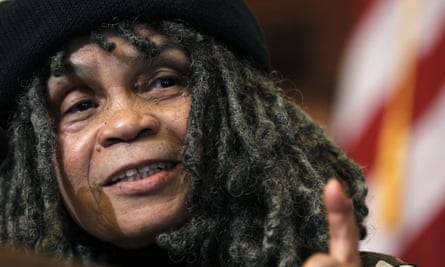
If all you heard during the long civil rights era was an endless blow of rage, you were missing out since you weren’t listening. The love was everywhere and all over the music. The piano player Ahmad Jamal told an interviewer: “I get my approach to life from the Holy Qur’an. I belong to the Ahmadiyya movement in Islam. Our motto is, ‘Love for all; hatred for none.’” (Many of the jazz musicians of that era came to Islam through the Ahmadiyya movement, a religious revivalist movement that began in late 19th-century India. It was led by Mirza Ghulam Ahmad, a charismatic reformer who believed he had received divine revelations that required him to promote the unity of all religions as manifest through Islam. Ahmadis came to the USA in the 1920s and found receptive audiences in African American communities.)
And it was a love supreme. I’ve argued elsewhere that Coltrane’s most famous song, A Love Supreme, has its own Islamic echoes (the chant “a love supreme” starts to sound a bit like “Allah supreme” after a while). Pharoah Sanders, who played with ’Trane starting in 1965, extended Coltrane’s legacy after his death in 1967.
Meanwhile, Sanders continued to build his own spiritually inflected, religious ecumenical style. His 1969 hypnotic track Hum-Allah-Hum-Allah-Hum-Allah meditates on the words “Prince of peace / Won’t you hear our pleas / And ring your bells of peace / Let loving never cease” for an enveloping and achingly beautiful 15 minutes. His classic The Creator Has a Master Plan had its own second coming when it was re-released in a trip-hop remix in the mid-90s. The Trance of Seven Colors, Pharoah’s work with the master Gnawa musician of Morocco Mahmoud Guinia is simply transcendent on an interstellar plane.
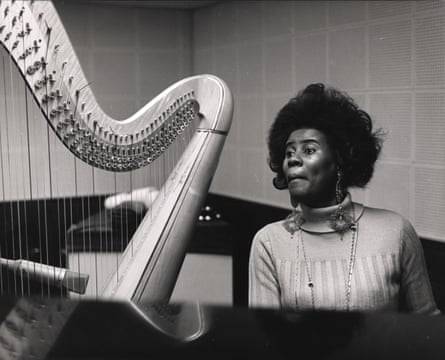
And it was a way of connecting to Africa. “The Christianity of the slave represented a movement away from Africa,” Amiri Baraka wrote in this classic text Blues People. “It was the beginning of Africa as ‘a foreign place’.” For the jazz musicians of this long and spiritual era, to reconnect with Africa was more than idle curiosity. It was a way of suturing back an essential part of you that had been forcibly torn from your collective body generations ago. By the mid-1950s and 1960s, African-themed events at nightclubs and restaurants in Brooklyn and Harlem abounded, with UN diplomats from newly independent African countries frequently dropping in. The jazz pianist and composer Randy Weston described the era: “Many of the African countries were just getting their independence. And the wonderful thing about being in New York, the United Nations is there. So I had an opportunity to meet many African diplomats. Many people from Kenya, from Nigeria, from Ghana, from Egypt, many parts of Africa. And I would always talk to them to try to understand a little more about the continent.”
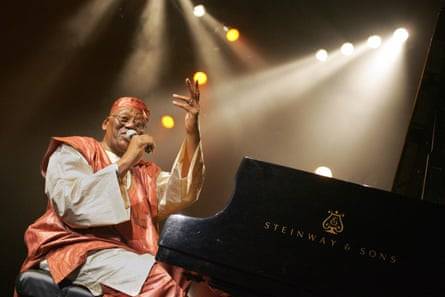
Weston eventually relocated to Morocco for about five years and traveled throughout the African continent before returning to the USA in 1972. “I went on a spiritual trip back home,” he told DownBeat magazine in 1998, referring to Africa. “I wanted to hear where I came from, why I play like I play, why we play music like we do. We went to about 18 countries, and wherever we went we asked to experience the traditional music of the people. Hearing the traditional music was like hearing jazz and blues and the Black church all at the same time.”
Weston also joined forces with master Gnawa musicians in Morocco. (He was playing with them and learning from them before Sanders did the same.) Others, such as Alice Coltrane, were moving in more eastern directions while still others, like Sun Ra, lived in intergalactic space and called us all to move in with him.
The spiritual jazz movement continued, but it didn’t take long for it to be eclipsed by other trends, everything from commercially accessible fusion, launched by the likes of Miles Davis, to the less accessible avant-garde innovations of Cecil Taylor or Albert Ayler. By the 1990s, jazz was also firmly ensconced in the ivory tower, featuring at prestigious arts institutions such as Lincoln Center and the Kennedy Center.
Still, the Islamic influence in American popular music never went away, though it did change addresses. Shifting from sound to word, Muslim references could now be found more in the new hip-hop than in the new jazz, even if hip-hop Islam was a yet more heterodox creed than the one found within the Ahmadiyya community. Foundational hip-hop artists including Rakim, Big Daddy Kane, and the Wu-Tang Clan were invoking the words and numbers of the Nation of Gods and Earths, an offshoot of the Nation of Islam.
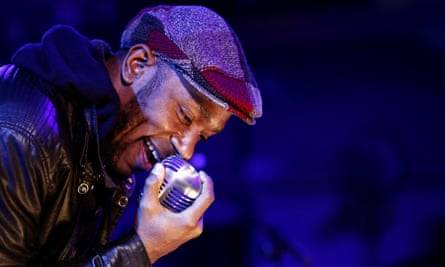
Five Percenter language has permeated the pop cultural lexicon. For example, the “G” in “wassup, G?”is not “gangsta”, as many might think, but “God”. In this creed, Five Percenter men are considered Gods, and Five Percenter women are known as Earths. “Dropping science” is a term from the Five Percenters, as is the emphatic term “word”, a short form of “word is my bond”.
Scholars have written on the important influence of Five Percenters on early hip-hop. But there are also other, more mainline Muslim influences on the American scene. Five Percenter doctrine was foundational in hip-hop, but it operated as an esoteric language among the educated and enlightened. The way the language and numerology (with an emphasis on the number 7) operated was to signify kinship and belonging, which was particularly important in the early hip-hop years. But other Muslim rappers, often associated with Sunni Islam, performed their deen, their faith, more in line with the jazz tradition that preceded it, as a search for self.

Mos Def is hardly the only one who invokes this devotional search. A Tribe Called Quest’s Q-Tip (Kamaal Fareed) is another. “Praise the Lord of the worlds that’s unseen / Respect me for that and let me do my thing,” we hear in the song Get a Hold. More recently, the Five Percenters, the Nation of Islam, and Sunni Islam (and more) tentatively unite to find a home in the lyrical power of Jay Electronica. “All I have in this world is my flag and my sword / I’m on the battlefield with the flag of my Lord,” rhymes Electronica in Fruit of the Spirit. “My shahada is my cantada / My heart chakra light up when I make sajda at fajr.”
While spiritual quests such as Jay Electronica’s aren’t as common in today’s hip-hop, the search hasn’t disappeared entirely. After all, the history of Black music shows us time and again how the journey seeking the divine produces such a profound musical experience.
And that’s what Pharoah Sanders leaves behind. His was an unyielding search for a way to transcend the secular ugliness of this world, and with his passing Sanders may have finally achieved that goal. Yet music – like all that is holy – never dies. And Pharoah’s saxophone will honk and shriek and envelop all our senses, reverberating to heaven and back, and maybe even beyond.
#Islam#Pharoah Sanders#how Pharoah Sanders found freedom and rebellion in Islam#Nation of Islam#5% Nation of Islam#Sunni Islam#Five Percenters#jay electronica#mos def#rakim big daddy kane#John Coltrane#St John Coltrane#Alice Coltrane
4 notes
·
View notes
Video
How To Calculate Airline Operating Costs
#Aviation Airline Aviationmemes Aviation Fly flight Airport FlightSafety IATA Pilot Crewlife Construction Demolission FlightTraining Funvideo#crew#Airline#Aviation#Fly#Flight#Airport#FlightSafety#Pilot Crew Life#Flight Traning#Fun Videos#Airline operating Cost
0 notes
Text
[EN] Multi-Dorm Training Camp
Apr 7th, 00:00 - Apr 13th, 22:59 (PST)
The Multi-Dorm Traning Camp comes back once again. Pick three students to raise in history and flight lessons. You can earn up to 180 gems with this event, as usual, and if you really want to raise a card, it’s a good moment to use those lesson items!
Also, don't forget to do your daily 10 elective special lessons!
NRC Dormitory Joint Training Camp

From 20-May 17:00 to 30-May 14:59 (JST)
How to play:




Some tips:
The selected characters get 3x more EXP than normal, so it’s the perfect time to use the lesson boost items!
By completing 10, 20 and 40 lessons, you unlock battles and get rewards if you win.
History: 2 macarons, 2 waffles, 1 lollipop (groovy candy) and 30 gems
Flying: 2 sugar cubes, 2 waffles, 1 lollipop (groovy candy) and 30 gems
That’s a total of 60 gems per character and 180 gems for all 3!
If you haven’t already started any lesson (from any of the 3 characters) and changed your mind on who you want to train, you can still choose someone else by clicking the button under their name:

For those that failed to get all 3 candies to groovy Grim (Anniversary), this is the perfect opportunity to get some more. Just make sure you select him as one of your student choices!


If you get this following message when you try to start a battle, it means that you need to have a certain character in your party. It will be the main student selected for those lessons.


On the example above, I’m trying to start Azul’s first History Battle (10 lessons done), but my team doesn’t have any Azul card.
There are 3 things I can do:
Select the Guest Character (Azul R)
Bring my own Azul card (any will do, doesn’t have to be the one being trained)
Select any Azul from the available supports shown (friend or random)
129 notes
·
View notes
Text

Word piloot bij de voordeligste Piloot opleiding van Nederland
Executive Flight Academy staat bekend als de Piloot opleiding met de laagste prijzen. Wij kunnen dit realiseren door zelf de instructeurs in te huren en het vliegtuigmateriaal van derde partijen te gebruiken. Van PPL tot ATPL, je vindt bij ons alle Europese vliegbrevetten en ratings. Onze opleidingen zijn bovendien flexibel in te plannen naast werk of gezin. Kom oriënteren en begin vandaag nog met je droomopleiding tot piloot!
1 note
·
View note
Text
Chapter 6: Fargo the Cattle Thief
For centuries cowboys have moved livestock through the plains, up and down the Continental Devide, from the mighty Mississippi to California and from the Brazos to the Rio Grand. Library shelves are lined with novels and historical fiction depicting cowboys and gun slingers, train robbers and horse thieves, bordellos, Comanches, Apaches and Crow.
A few days with Fargo was akin to speed reading volumes of Zane Gray, Larry McMurtry, Louis L'Amour with a smattering of Laura Ingles Wilder thrown in. When I was growing up cowboys were legends and here I was with my boyhood hero.
As a young cowboy Fargo went where there was work. He was in Montana when he and his buddy were offered fifty cents a head to drive cattle over to the Canada side. Fargo said no. The ante was upped to three dollars, but Fargo smelled a skunk. Something about these guys he didn't like. When the offer reached a lucrative five dollars a head, Fargo's partner weakened and made the deal.
Crossing over the border they were run down by the border patrol and charged with taking stolen cattle into Canada. After a night in jail and pleading mea culpa, the judge gave Fargo the choice of doing time or joining the Cavalry in Korea as a civil servant. He made the choice and took his first air flight to the other side of the world.
Fargo performed well in Korea shoeing mules and horses for the U.S. Cavalry. At night he would shoe the villager's mules for a little extra cash which he attributes to saving his life. He was particular about his farrier work making sure hoves were cleaned, trimmed and polished with brown shoe polish that he always carried in his supplies.
One time, he recalls, he and 2 soldiers were riding along a waterfront. They were ambushed and his two friends were shot off their mules and were killed. "The damn Gooks didn't kill me because they recognized me as the 'good shoer' from the village."
Later, he remembers, he was being transported with other troops and three crated mules in a C57 when the plane caught fire. He, being a civilian, had no parachute traning but was quickly harnessed and pushed out of the burning plane along with three crated mules. He found himself behind enemy lines with only two mules that survived the jump. The surviving mules began braying for the third mule who had met it's fate in the jump. Afraid the "Gooks" would hear the mules, Fargo rubbed shoe polish on their noses to quiet them. I assumed they were busied trying to lick it off. But it shut them up.
Crouching by a roadside, he finally heard English being spoken and saw a Jeep with US military personnel approaching. Boy were they supprised when an American kid with two mules came out of the bushes.

When he got back from the war he worked for the circus awhile. He respected the animal trainers and learned alot from them, but he had no use for the people who performed high wire acts.
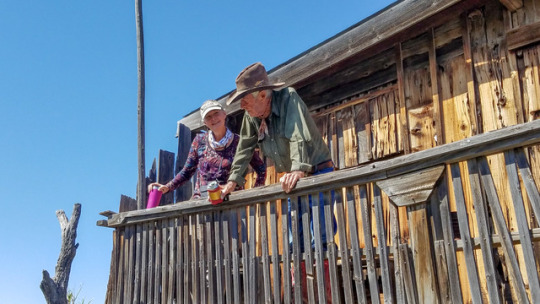
At one point in his life, Fargo joined the Texas Rangers and while he did not know Pancho Villa, he had respect for how Ole Poncho and General Pershing handled the Comanches and the "wet backs." Fargo showed us his Texas Ranger badge which was struck from a Mexican peso. He had several pictures of Poncho and his friend Edgar May, from his horse breaking days.
Becky and I sat and listened to Fargo as he told stories. If he couldn't recall he would look puzzled and tell you, "I don't remember," or "I can't recall." But if you asked a question that he had already covered, he would snap, " I already told you that dummy!" He did not hesitate to give you his opinion. He liked Paul Newman but thought Robert Redford was a brat. He liked John Ford, but told the story about when his Raven bit John's ear. He did not like Michael Landon of "Little House" but liked Hoss (Ben Cartwright) of "Bonanza.
He was not impressed with or did he care for Mike Wolf or Frank Fritz who visited The Ranch early in their career as American Pickers. He said that the two and their crew were not respectful.
Fargo is a man of strong prejudice and kind passions. There were questions we wanted to ask but felt there were times in his life he would rather not talk about.
Never have I felt like I struck a chord with anyone like I did with Fargo. He was the childhood hero that took me 60 years to meet.

2 notes
·
View notes
Text
January 15, 1959

John Coltrane and Milt Jackson, 1960 (Lee Friedlander)
The day after Coltrane finished his two weeks with Miles Davis at Birdland, he had his first recording date for Atlantic. He joined star vibraphonist Milt Jackson — one of the label’s more popular jazz artists — at Atlantic Studios (57th Street and 7th Avenue) for the one day session; Coltrane and Jackson had actually worked together previously when they were both in Dizzy Gillespie’s quintet in the early ‘50s.
Both Coltrane and Jackson are on this 1951 recording of one of Diz’s best known compositions, “Tin Tin Deo.”
youtube
For this session, they played a couple standards, and a few Jackson originals — including “Bags & Trane,” which would become the album title. “Bags” was Milt Jackson’s nickname, allegedly because of the bags under his eyes (rude). The playing is mostly very gentle in its virtuosity — the rhythm section, Paul Chambers, Hank Jones, and Connie Kay, mostly cede the spotlight, contenting themselves to establishing solid swing.

Milt Jackson, 1960 (Lee Friedlander)
It’s an album that often gets lost in the Coltrane 1959 fray, simply because he was on the cusp of some of his most memorable work. But Bags & Trane, which wouldn’t be released until 1961, is textbook hard bop fare (in a good way!) even if it doesn’t spotlight Coltrane at his most mind-bending. On “The Night We Called It A Day,” he’s fairly reverent without really losing his edge; on “Be-Bop” — a Gillespie tune that they likely performed together while in his band — he takes flight.
youtube

John Coltrane, 1960 (Lee Friedlander)
In its July 24, 1961 edition, Billboard reviewed the album and dubbed it a “Spotlight Pick.” “It’s veritably an all-star line-up and the group plays with stylish rapport, going much of the way on the so-called statement and answer technique [Ed. note: I believe that’s what normal people would refer to as “call and response.”],” they wrote.


The liner notes are kind of odd. “If contemporary jazz has lapsed [Ed. note:???}, it has lapsed because of an increasing failure in what may be called collective improvisation,” wrote Charles Harris Garrigues. He continues to argue that this album, with its traditional sound and approachable tone, is an aberration in the course of that decline.
To modern ears, though, it sounds less like an exception and more like a great example of a go to sound during this period.
12 notes
·
View notes
Text
Ornette Coleman — Ornette At 12/Crisis (Real Gone Music)

youtube
Ornette Coleman was one of the key figures of jazz. Impulse Records is sometimes characterized as the house that ‘Trane built, and its catalog has been deeply mined during the CD age. So why on earth have Ornette At 12 and Crisis, which were recorded in 1968 and 1969, languished out of print until 2017? The label doing the reissuing doesn’t really explain it, beyond acknowledging that “somehow” they “have never been reissued on CD.”
The explanation might be in the credits. The drummer on both of these records was Ornette’s son, Ornette Denardo Coleman (thus the first album’s title), who first recorded with his pop on The Empty Foxhole when he was 10 years old. Father caught a load of shit for having his son fill the chair previously occupied by Billy Higgins and Edward Blackwell. Look a little further and you’ll notice that Ornette plays trumpet and violin as well as alto sax. He’d picked these instruments up earlier in the 1960s, partly to cope with the departure of his trumpeter Don Cherry and partly to come to grips with orchestration. He was a complete autodidact on both instruments, and his choice to do his learning in public offended some and bummed others.
Another factor may be the recording quality, which was a little on the rough side compared to the music Ornette recorded for Blue Note in the mid-1960s and that which he would record for Columbia in 1972. But that’s still a stretch given the number of official bootleg releases that have come out in the CD age, starting at the top with a series of Miles Davis concert recordings on Columbia Legacy. This CD, reportedly mastered from the original tapes, booms a bit in spots, but there’s no distortion that would get in the way of appreciating the music.
The answer, most likely, has been summed up best by the name that Bill Orcutt once gave a cassette; Why Does Everybody Love Free Music But Nobody Loves Free People? Ornette had already drawn both accolades and opprobrium with his classic sides for Atlantic, which proposed freeing jazz improvisation from chord changes. But here he was, challenging the primacy of instrumental accomplishment AND returning a kid to the drum stool. He was doing what he wanted, and it was just too much. Which is a damned shame, because this music sings with the same fused joy and pain that persisted through all of Ornette’s work. The melodies, whether they’re his or by bassist Charlie Haden, are bold and communicative on their own, as well as being secure springboards for no-net improvisational flights of imagination. When Ornette takes off from the dignified theme of “Song For Che” for an unaccompanied improvisation, the effect is thrilling; when Haden and Denardo come back in, he rides their unstable surfaces like a master surfer, gracefully and exactingly responsive. And when Haden and Denardo duet after that, their exchange is loose but quite musical. The drummer may be young, but he gives his master partner plenty to work with.
This music profits from the tension between certainty and genuine uncertainty. It’s not clear exactly how Ornette’s going to get where he’s going when his trumpet takes the lead on “Rainbow,” but a series of responses from Haden, Denardo and tenor saxophonist Dewey Redman co-steer the music with white-knuckled immediacy. And when Don Cherry and Redman wield secondary woodwinds of their own to tangle with Ornette’s violin on “Trouble in the East,” they whip up a quick-moving tangle of sound whose mercurial flux is its own reward. Maybe this stuff was too damned free for somebody, but it’s damned fine.
Bill Meyer
33 notes
·
View notes
Photo

Med Aviate
Logo and identaty of flight traning and flight medical services.
3 notes
·
View notes
Text
Atlanta’s spending $58M on new Plane Train cars to move you better around airport

Catching a flight here almost always requires a Plane Train ride. | Ramin Talaie, Getty Images
And that’s a fraction of the plan to expand the on-campus transit system
It should come as no surprise that Hartsfield-Jackson Atlanta International Airport is set to drop big bucks to expand its primary (non-plane) people-moving system.
Moving people efficiently, after all, is a top priority at the world’s busiest passenger airport.
Plans to expand the Plane Train system—not to be confused with the above-ground ATL SkyTrain—entail spending $58 million on new cars, according to the Atlanta Journal-Constitution.
And that’s just a fraction of a much larger plan to bolster the people-moving capacity of the Plane Train.
Officials also expect to spend some $260 million to extend the Plane Train tracks to afford the cars more room for maneuverability.
Essentially, more breathing room makes it easier for the trains to switch direction after they arrive at the domestic terminal.
The Plane Train now has the capacity for 11 four-car trains to run in concert between the domestic terminal, concourses, and the international terminal, according to the paper.
The nearly $60 million purchase is expected to bring 14 more cars to the system. They’d be delivered in about two years.
Once the track is extended, up to 15 trains would be able to run simultaneously.
News of the impending Plane Train car purchase comes on the heels of College Park officials moving forward with plans to create a potentially 420-acre “Airport City” next door to the airport.
That colossal development could yield nearly 5 million square feet of high-end office space, up to six hotels, and more than 750,000 square feet of restaurants and retail, not to mention an outlet mall and a massive network of multi-use trails.
source https://atlanta.curbed.com/2019/8/23/20829554/atlanta-airport-city-plain-trane-cars-expansion
0 notes
Text
Premium Banner Bundle - 420 Animated HTML5 Banner Templates (Ad Templates)

PREMIUM BANNER BUNDLE
This bundle has 60+ premium banners ever on codecanyon. You get 420 editable files along with this that are easy to edit in Photoshop and Google Web Designer software. For easy edit, free video tutorials and documentation is provided.
Files included with the download file
Editable Google Web Designer files
Photoshop Files (.psd)
Published Files
Documentation (.pdf)
7 Banner Sizes Included
300×250
336×280
200×200
160×600
300×600
468×60
728×90
60 Banner Sets Included
Business 01
Business 02
Business 03
Business 04
Business 05
Higher Education
Playschool Banner
Tuition Class
Luxury Bar
Restaurant Banner
Fitness Expert
Traning Equipments
Health Supplement
Yoga Class
Medicare
Multipurpose 01
Multipurpose 02
Multipurpose 03
Multipurpose 04
Multipurpose 05
Beauty & Spa
Architect
Medical
Yoga & Meditation
Cleaning Service
Web Design
Cloud Service
Hosting Server
Pet Care
Pest Control
Lawyer
Design Studio
Plumbing Service
Tutor
Carpenter Service
Laundry Service
SEO
Hair Salon
Wedding Planner
Event Management
Interior Designer
Real Estate Agent
Rented Property
Fashion Accessories
Big Sale
Gadget Booking
E-book
Valentine Sale
Mobile Application
Shopping
Christmas Sale
Black Friday Sale
Flight Booking
Taxi / Cab Service
Yacht Booking
Holiday Travel (TT004)
Adventure Camp
Hotel Booking
Honeymoon Booking
Holiday Travel (TT008)
All these banner ads are compatible with Google Ads, Adroll, Google 360 and more…
Got Customization? Check out our Design-On-Demand
For any support or queries, kindly drop us a message. We would love to assist you!
from CodeCanyon new items https://ift.tt/2ztZPEV via IFTTT https://goo.gl/zxKHwc
0 notes